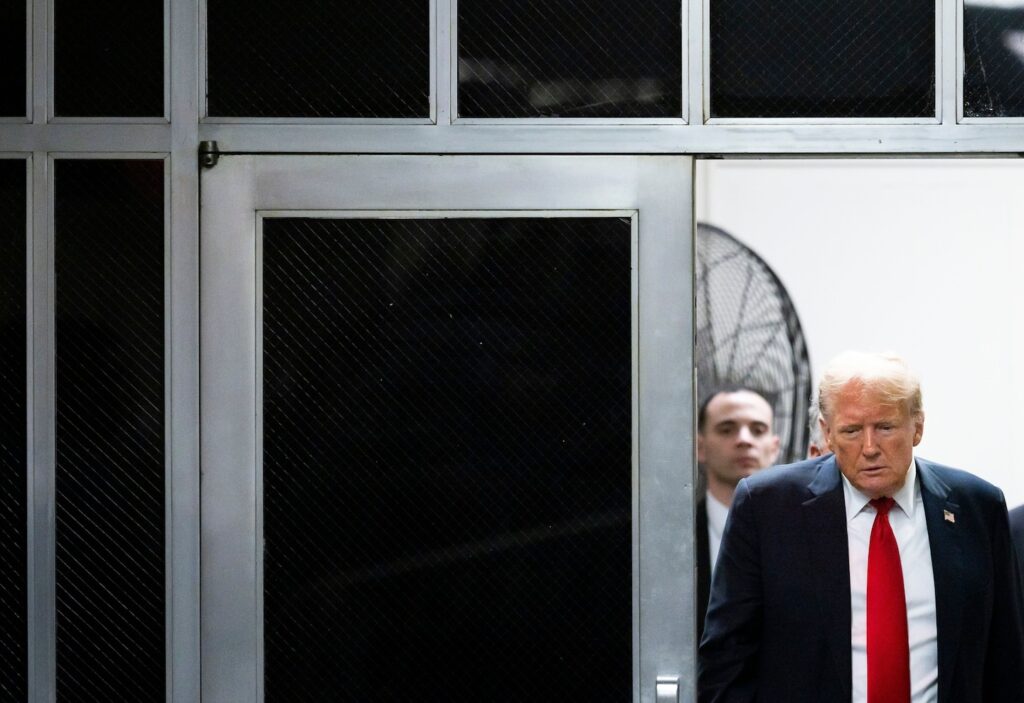If you look closely at the right, you'll see a continuum of a phenomenon called “election denial.” Die-hard election deniers harbor absurd ideas, like that Joe Biden won Arizona's 2020 election thanks to “bamboo ballots” shipped from Asia. Meanwhile, many Trump supporters who deny the legitimacy of Biden's 2020 victory rely on vague theories that are not easily disproven, like that social media companies influenced the election by concealing damaging information about Biden's son's business dealings.
In closing arguments on Tuesday, New York prosecutors dabbled in the latter form of denial about the 2016 election. No, that's not a false equivalence. The crux of Joshua Steinglass' closing argument for convicting Donald Trump was that Trump conspired “to manipulate and deceive voters” by covering up damaging allegations of an extramarital affair. That cover-up, Steinglass said, “may well have contributed to President Trump's election.”
In other words, Trump may not have outright stolen the presidency, but he gained it fraudulently by misleading voters. This soft form of election denial alluded to by New York prosecutors may be even more pernicious than the crazy bamboo-voting trope, because it allows even intelligent and informed people, especially intelligent and informed people, to reject political outcomes they don't like.
In most political campaigns, Americans only learn facts that may be relevant to their vote after they have cast their ballot. Hillary Clinton's 2016 campaign settled a lawsuit with the Federal Election Commission in 2022 for failing to properly disclose the costs of an opposition investigation that had revealed false information about Trump's ties to Russia. If Trump is convicted in New York, prosecutors will create a legal and political road map for partisan attacks on the legitimacy of an election after the fact.
 Follow this author Jason Willick's opinion
Follow this author Jason Willick's opinion
Prosecutors charged Trump with falsifying business records to hide non-disclosure payments to Stormy Daniels, but in opening statements argued the case was about “election fraud.”
In his closing argument, Steinglass spelled out his case: “Democracy gives people the right to choose their leaders, but it is predicated on the fundamental premise that voters have access to accurate information about the candidates.” If voters have inaccurate information — or, in Steinglass's words, if candidates “mislead the voters” — then voters are clearly being misled.
Mr Steinglass said voters had a “right to make up their own mind” about Ms Daniels' account of her affair with Mr Trump. If the jury agrees, it could find Mr Trump committed one of the charges, “with intent to defraud”.
Whether or not it is legally correct, the prosecutors' theory reflects a dangerously distorted view of democracy and its achievability. The US democratic political system depends on candidates running for public office having the right to say whatever they want about each other, and on the media having the right to report freely and without fear about the candidates. That competitive process will generally yield good information for voters. In fact, voters had a pretty good idea of what kind of person Trump was when they elected him. But completely complete information is never available, and an election is not rigged even if important information surfaces after the vote.
It is no exaggeration to say that this view, if widely accepted, would lead to the undermining of democracy because it would call into question the legitimacy of many elections.But it is at the heart of prosecutors' efforts to convince a jury that Trump should be convicted on a complex web of contemptuous charges that combine an unfair mix of misdemeanors and felonies, federal and state laws.
As for the lack of information calling into question the legitimacy of the election, let's say a jury convicts Trump, voters go to the polls this November believing he's a felon and deny him a second term, and then the conviction is overturned on appeal. Steinglass said democracy is destroyed when voters lack “accurate information about the candidates.” But under that (plausible) assumption, voters' information will be grossly inaccurate. Trump would have been wrongfully convicted.
Does that mean the 2024 election was illegitimate? Absolutely not, in my understanding of democracy. Maybe not, in the understanding destructively promoted by New York prosecutors on Tuesday. Denial of an election begets further denial of elections in the future.
This is not to say that fraud can't be used as a political insult — partisans can hold opposing parties politically accountable for schemes to gain advantage or betray their base — nor is it to say that politicians can't be prosecuted for campaign finance violations and the like (though there's a reason these are usually treated as civil, not criminal, offenses).
The danger is when vague, inflammatory charges of electoral fraud are seen as a basis for prosecuting opponents or delegitimizing the results. Partisan lies that rigged the election are always a convenient excuse for the losers, but they have no choice but to accept the outcome anyway. This requires political subterfuge, such as turning a blind eye or respecting the “sacred” judgment of the voters, but that is the price of self-governance.



